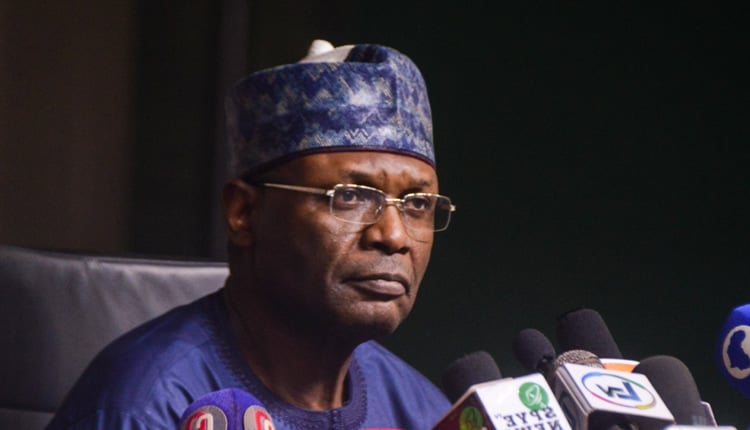President Bola Ahmed Tinubu has officially accepted the exit of Professor Mahmood Yakubu as Chairman of the Independent National Electoral Commission (INEC), marking the end of Yakubu’s second and final tenure in office.
Following this development, the President is expected to announce a new INEC Chairman after Thursday’s Council of State meeting in Abuja, where the list of nominees for the position will be presented.
On Tuesday, Yakubu formally handed over to May Agbamuche-Mbu, a seasoned legal practitioner and national commissioner, who will now serve as Acting Chairman pending the appointment of a substantive head.

In appreciation of Yakubu’s service, President Tinubu has also conferred upon him the national honour of Commander of the Order of the Niger (CON).
Former Presidents Olusegun Obasanjo and Goodluck Jonathan, state governors, and other members of the Council of State are expected to advise President Tinubu on the appointment of Yakubu’s successor.
According to a statement issued by the President’s Special Adviser on Information and Strategy, Mr. Bayo Onanuga, Tinubu expressed gratitude to the outgoing INEC Chairman for his contribution to Nigeria’s democracy.
The statement, titled “President Tinubu Accepts INEC Chairman’s Departure, Bestows National Honour on Him,” reads:
“President Tinubu thanked Professor Yakubu for his dedicated service to the nation and his efforts in strengthening Nigeria’s democracy through the conduct of free and fair elections across his two-term tenure.
In recognition of his service, the President has conferred on him the honour of Commander of the Order of the Niger. The President also directed that Professor Yakubu hand over to the most senior national commissioner, Mrs. May Agbamuche-Mbu, who will oversee the Commission until a new chairman is appointed.”
In a letter dated October 3, 2025, Professor Yakubu expressed appreciation to the President for granting him the opportunity to serve two terms as the head of INEC.
Yakubu was first appointed in November 2015 as the 14th INEC Chairman for a five-year term and was reappointed in 2020 following Senate confirmation. During his decade-long tenure, he supervised the 2019 and 2023 general elections and numerous off-cycle polls.

Under Yakubu’s leadership, INEC introduced several technological reforms, including the Bimodal Voter Accreditation System (BVAS) and the Results Viewing Portal (IReV), which allowed real-time access to polling unit results. The BVAS was first piloted during the 2021 Anambra governorship election before its full nationwide implementation in the 2023 general elections, as mandated by the Electoral Act 2022.
Yakubu also introduced continuous voter registration, increased the number of polling units across the country, and improved accessibility for voters, including persons with disabilities and internally displaced persons.
He strengthened collaboration with political parties, civil society organisations, and international observers, ensuring transparency and accountability in election management. His administration also established the Election Monitoring and Support Centre (EMSC) to track performance and ensure efficient oversight.
Despite these achievements, Yakubu’s tenure faced criticism over technical glitches during the 2023 elections, delayed transmission of results, and logistical challenges at polling units. Some political actors accused INEC of bias, though the Commission maintained its neutrality throughout.

As discussions grow over reforms to the appointment process of the next INEC Chairman, legal experts have weighed in.
Senior Advocate of Nigeria (SAN), Ifedayo Adedipe, described the current debate on who appoints the INEC Chairman as misplaced, urging Nigerians to focus instead on broader electoral and governance challenges.
He said:
“Was it not former President Jonathan who appointed Professor Attahiru Jega, under whom he lost the 2015 election? The real issue is not who appoints the chairman but the integrity of the electoral process itself. Politicians who engage in vote buying and manipulation are the real problem.”
Adedipe emphasised that credible elections depend more on the conduct of citizens and political actors than on who occupies the office of INEC Chairman.
Another legal expert, Adedayo Adedeji, SAN, maintained that there is nothing unconstitutional about the President appointing the INEC boss, provided the appointment is subject to Senate confirmation as outlined in Sections 153 and 154 of the Constitution.
“The appointment process already contains checks and balances through Senate screening. What’s crucial is that the process must be transparent and devoid of political interference,” Adedeji stated.
He also urged broader consultations before any appointment, referencing earlier recommendations from the Committee on Electoral Reform that sought to make the process more independent.
Similarly, Wale Balogun, SAN, called for a credible and transparent selection procedure, noting that while the existing framework can produce reliable leadership, it remains susceptible to abuse if not strengthened.
“The present system has sufficient provisions to ensure a credible appointment. However, its weakness lies in implementation. What matters most is appointing a person of integrity who can uphold the independence and credibility of INEC,” Balogun concluded.




